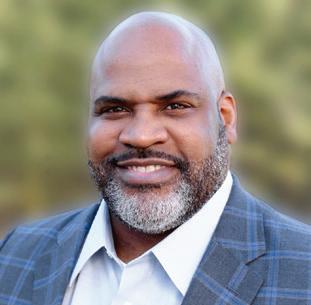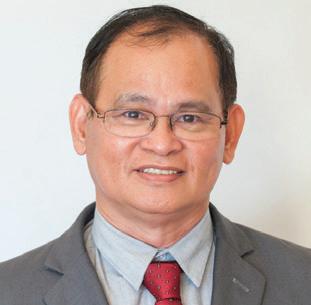
6 minute read
Challenges and Opportunities Impacting Our Future
Pastors are God-given gifts to the church. They are the shepherds who guide, feed, and protect God’s fock so that the fock can fourish. Good pastors, however, are not only concerned with present provision, but they also look to the future to ensure future health and safety. As a church body, we must recognize and address the challenges facing our organization so that our churches will continue to fourish.
One issue impacting the future of our movement is the role of the local pastor in developing our movement’s future leaders. Developing emerging leaders in the local church has always been part of the pastor’s responsibility. However, developing emerging leaders within the context of the local church to supply the movement with ministers has not always been a priority. If anything, many have tried to “keep their good leaders” from the movement so they can help the local church grow. Obviously, local churches need leaders as well, so I am not suggesting we seek to send out everyone. However, we do learn from Acts 16 that the local church encouraged its young leaders to serve beyond the local congregation. Paul and Peter often traveled with young leaders developed within local ministries who embraced their role beyond their “home congregations.”
Trevor Reid serves as lead pastor of the Bridge of Hope Church in Greensboro, North Carolina. Trevor earned a Bachelor of Science in Education, minoring in Biblical Literature from Nyack College, and went on to receive a Master of Divinity from Liberty Theological Seminary. He is an ordained bishop with the Church of God of Prophecy. He is married to Dr. Aileen Reid, and they have three children.
BISHOP TREVOR REID | GREENSBORO, NORTH CAROLINA

These emerging ministers belong to God and not to the pastor or to that “home” church. The local pastor’s ability, willingness, and generosity in time, mentoring, and equipping are crucial to ensuring we have leaders for the movement (2 Timothy 2:2). I believe pastors raise the best pastors! Today’s COGOP pastors and local congregations must feel the burden to raise up ministers for the kingdom of God in these last days!
Another critical issue facing our future is recognizing apostolic ministry outside of “trans-local appointments.” As a movement, I am not sure we have adequately recognized the “gifting of apostolic ministry” within the context of the pastorate. Apostolic leaders, or leaders who feel the burden to expand God’s work through the Church where it has not yet gone, exist not only among trans-local appointees but also within the local church. These are leaders who do not just want to plant a church; they want to raise leaders who make disciples and send them out in various contexts, communities, and environments. We must affrm, support, and encourage pastors with this gift of the Holy Spirit. Many of our trans-local appointed leaders are so enmeshed in the administrative duties of the ministry that they do not have the time, energy, or (in some cases) vision to go where the movement has never gone. Local pastors are strategically placed to consider cities nearby that are unreached by our movement. All pastors are not wired for this, but some are. We must encourage pastors and congregations to dream beyond the limits of their own cities. Our movement has few “large congregations,” but we do have many “healthy ones.” These churches can send disciples to other towns for the purpose of making disciples who will become either a campus of that local church or a new church plant. The goal is neither control, nor credit, but mission. We can and must return to the missional spirit where our movement began. We have affrmed traditional pastoral, evangelistic, and teaching gifts. The time has come to discern and unleash the apostolic gift among us. Another issue impacting our movement is the embracing of Jesus’ discipleship model. I believe that not only is his message sacred, but his model of ministry is sacred as well. When we study the way Jesus discipled there are at least seven practices that he modeled in the Gospels that must be embraced by pastors, leaders, and members:
1) He personally spent time with God the Father (Mark 1:35; Luke 5:15–16; Mark 3:7; 6:31–32). Part of the discipling experience is regularly setting aside time to commune with the Lord.
2) Jesus spent time with people far from God on their turf (Luke 15:1–2; John 4:4). If we are going to disciple like Jesus, we must spend time with people who do not know Jesus— people who do not think like us, agree with us, or even like us! Establishing relationships with people who did not know God was a key part of Jesus’ method of making disciples.
3) He depended upon the Holy Spirit (Philippians 2:5–8; Luke 4:1–2; 4:18; John 1:32–33; Acts 10:37–38; Romans 8:11; Galatians 5:16). We spend a great deal of time focusing on our “Pentecostal heritage” which takes its name from Acts 2. However, the Spirit-flled life did not begin on the day of Pentecost; it began at Jesus’ baptism. Actually, once Jesus determined with the Father that he would set aside his divine power to exclusively live dependent upon the Holy Spirit’s power, the Spirit-flled life was born! We must, like Jesus, be flled with his Spirit by yielding to him daily. Prayer, fasting, consecrating ourselves to him, and living for his kingdom mission (and not our own) are part of the Spirit-flled life.
4) We must love the disciples (John 11:3; 20:2; Acts 2:40–47). The fellowship of the body is critical if we are to bring people who are leaving family, culture, and other religions into the kingdom of God. Jesus loved his disciples, and we must love one another deeply, generously, and consistently.
5) Jesus discipled many, but he invested more of himself in a few, rather than the masses (Mark 5:37; Matthew 17:1; Luke 8:51). He had hundreds of disciples according to 1 Corinthians 16, but the Gospels record him spending a great deal of time with not only the Twelve, but more specifcally Peter, James, and John. If we are to be effective disciples, we must identify a few to whom we will give ourselves intimately.
6) He lived what he wanted to see (Luke 16:12; John 4:4, 7; Luke 19:5; 22:42; Mark 1:14–17). Jesus did not ask of others what he himself was not willing to do. He served, obeyed the Father, forgave, and was generous.
7) He sent out those he discipled (John 17:18). This is a missing part of our personal disciple-making. I am not referring to the local congregation, but each disciple must disciple others and equip them to make disciples in their personal network.
I have personally had to revisit my job description, weekly practices, and even my church schedule to align my ministry and work with Jesus’ disciple-making model. I have had to intentionally commit to inviting unbelievers to my home though they have never been to our church. I had to commit to discipling three to fve people weekly as part of both my ministry and my personal call. There are more adjustments to be made, but this is not just a “pastoral” issue.
The average believer must be discipled to do what Jesus did. Until we believe that the last and youngest disciple must be oriented to follow Jesus’ way of disciple-making, we risk our future. Classes do not disciple; people disciple. Positions do not disciple; people disciple. Jesus—the Savior, the Lamb, the King of kings—modeled for us how to fulfll his mission, and if we do not go back to his way, we risk our future! The Church will continue, but our commitment to his mission without excuses and exceptions will determine if WE survive.
Asia, Australia, and Oceania: A COGOP Pastor Answers Questions

Jesus commanded us to go and make disciples of all nations. He knew there would be challenges, yet he commissioned his disciples to go. Bishop Nonito Que outlines some of the challenges and opportunities he sees facing the Church of God of Prophecy as the Church seeks to fulfill the Great Commission in the region where he serves.
What are your current ministry opportunities and challenges?
• Opportunities o Opportunity for the local church to be part of planting mission churches in areas worldwide. o Better training opportunities for church members through COGOP LDD materials available online. o Opportunity to be part of the work in mission fields brought by easier ways to transfer funds using the Internet. o Opportunity for the local church's spiritual growth especially of children and youth.
• Challenges o Prohibitive cost of airfares to attend face to face trainings due to our geographical location. o Reversal of a lackadaisical attitude to church attendance brought about by regulations on face-to-face church services during the COVID-19 pandemic. o Economic challenges due to the steep rise of cost of living. o Challenges in unity among church members.
What do you believe are the most pertinent issues impacting the future of the COGOP?
• The ability to hold on to unchanging Biblical standards without compromise amidst a fast-changing world, especially in the area of holiness and morality.
• Flexibility and effectiveness of methods against operation cost in the work needed to reach the unsaved.
How are you motivating your people to reconcile the world to Christ?
• Reminding ourselves that although we see with our eyes, people by culture are attending church every Sunday in the Samoan Islands; fulfilling the Great Commission to teach and preach the gospel of our Lord Jesus Christ and to make disciples is still needed, the more so today.
• Reminding ourselves of the need to be more fully aware that we are ambassadors of Christ and, as such, live as examples of godliness to more effectively reach out to the lost in our communities.










